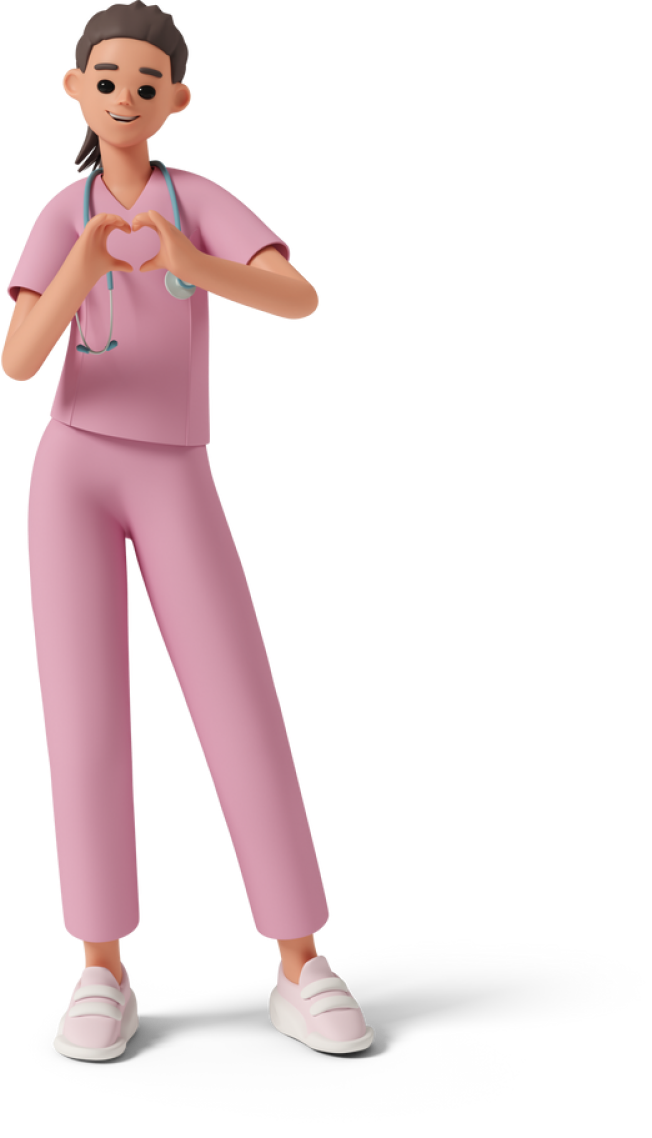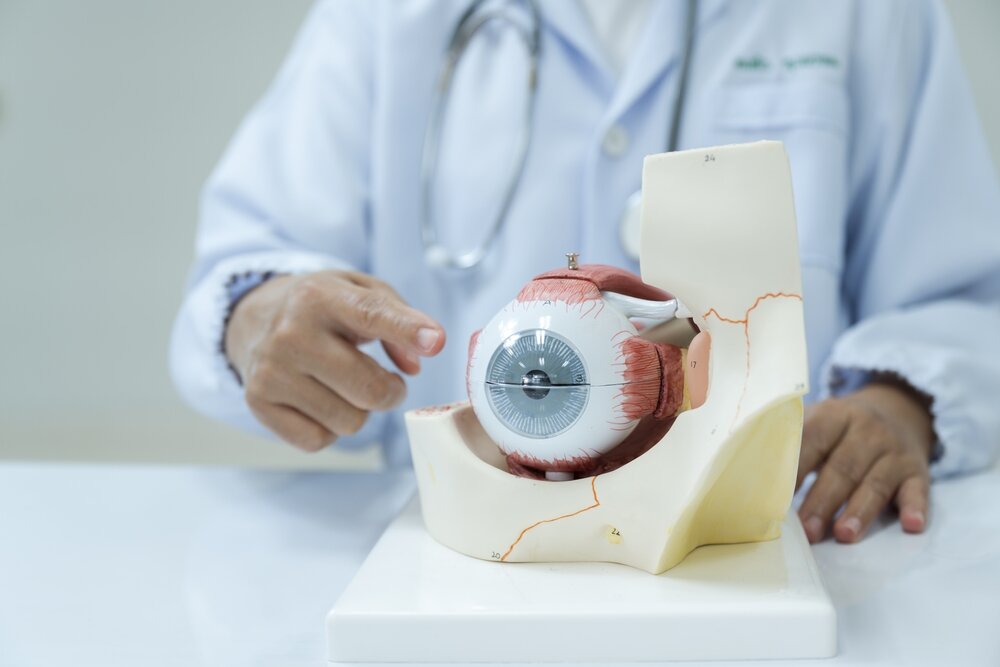
☝️ The most important facts in brief
- The study of medicine is divided into pre-clinical, clinical and subsequent practical year (PJ)
- In the pre-clinical part of the course, general scientific and medical basics are taught, while the clinical part deals with specific specialist areas such as surgery, dermatology and gynaecology.
- For admission to the state examination and a licence to practise medicine, you must pass the examinations in all subjects.
📖 Table of contents
The medical degree programme consists of a variety of subjects: from anatomy to internal medicine, the content is taught in lectures, practical courses and clinical traineeships. The degree programme includes a practical year, during which the future doctors work in the clinic under supervision and at the same time prepare for the final examination.
Are you interested in studying medicine?
We will be happy to advise you free of charge about your options for studying medicine, including advice on studying medicine in another EU country, which is fully recognised in Germany.

Study medicine abroad with futuredoctor
Do you dream of studying medicine, but the chances of getting a place in your home country are slim? We can help you find a suitable study place abroad.
Advantages at a glance:
- EU-wide recognised qualifications
- Study in English or German
- > 95% Success rate
- > 1,000 study places allocated
From the selection of universities and support in the application process to orientation and finding accommodation - we are at your side.
The basic division of the medical degree programme
The medical degree programme is structured in such a way that there is a separation between the pre-clinical and clinical parts. During the first semesters, students first learn basic scientific and medical content that is important for medical practice.
The subjects then become more specific and individual diseases and their treatment are discussed in more detail.
The two phases of the medical degree programme, which are characterised by lectures and courses, are followed by the practical year, which enables students to apply what they have learned in real medical situations.
This systematic structure of the degree programme is intended to ensure that future doctors are thoroughly prepared for their profession and make effective use of every semester of the standard period of study. We will now briefly introduce you to the three parts that characterise the medical degree programme.
Preclinic
In the pre-clinical phase of the medical degree programme, students learn the basics of medicine and the natural sciences. The most comprehensive subjects here are anatomy, physiology and biochemistry. They prepare students for later clinical content and form the basis for the Physikum, the first major medical examination in the course of the medical degree programme.
Clinic
The clinical part of the medical degree programme includes many specific subjects in which specialist training is also possible after completing the entire course. Whether internal medicine, Surgeryotorhinolaryngology or other specialisms: For each subject, there is a written examination with multiple-choice questions at the end of the relevant semester.
The practical year (PJ)
During the practical year of the medical degree programme, students gain clinical experience in hospitals. They rotate through various specialisms such as internal medicine, surgery and an elective subject in order to gain professional experience for their work as future doctors and round off their studies with practical knowledge before taking the medical examination.
The preclinical subjects in detail
The pre-clinical phase comprises the first four semesters and is dedicated to the basics that are important for future doctors. There are several "minor" and some "major" subjects in this stage of the programme, which we will look at in more detail in a moment. In addition, during this time you must complete a Nursing internship and first aid training.
Chemistry, biology and physics: the "small" subjects in preclinical studies
Although chemistry, biology and physics are taught to a much lesser extent than other subject areas during the pre-clinical phase, they are nevertheless important for further studies and for the written part of the medical examination.
In chemistry, medical students learn about the molecular building blocks of life. Biology provides basic knowledge about cells and organs, while physics explains principles that work in the body and are also relevant for medical devices.
At many universities, the lectures for the "small" parts of the pre-clinical programme take place early in the morning, which makes them relatively unpopular with students. However, it is still advisable to attend regularly in order to be able to master the Physikum later on.
Anatomy
Anatomy is an extremely important subject right at the beginning of medical school. It deals with the structure of the human body. As a central subject, anatomy lays the foundation for understanding all clinical subjects. Students learn about bones, muscles, organs and tissue in order to be able to diagnose and treat diseases later on.
Physiology
Physiology is a key subject in medical studies that describes the functions of the human body. Students study how organ systems work together and react to stimuli. This knowledge is fundamental for every doctor to be able to understand diseases and treat patients in later semesters.
Physiology combines basic principles with clinical medicine. The knowledge acquired here in the early semester is therefore also very important for the later stages of the programme.
Biochemistry
Biochemistry is about how chemical processes influence life in the body. This subject clarifies the molecular basis of health, disease and regular bodily functions and thus forms the basis for understanding drug therapies. Here, future doctors understand what the theory-orientated natural sciences have to do with practical applications.
Medical Psychology / Sociology
Psychology plays a crucial role in medical studies because it is important to understand the actions and intentions of patients in order to provide them with the best possible help.
Whilst medical psychology was still part of the oral physical examination under the old licensing regulations, it is now only examined in writing under the new licensing regulations.
The compartments of the clinic in detail
While the number of subjects in the pre-clinical part is still relatively manageable, there is a whole range of subjects in the clinical phase in which you have to complete lectures, courses and sometimes practical placements.
The study workload is therefore high every semester and you should make a good plan to cope with it. Below you will find an alphabetical overview of the clinical subjects:
- General medicine
- Anaesthesiology
- Occupational and social medicine
- Ophthalmology
- Surgery
- Dermatology
- Gynaecology
- Ear, nose and throat medicine
- Human genetics
- Hygiene
- Internal medicine
- Clinical chemistry
- Microbiology
- Neurology
- Orthopaedics
- Pathology
- Paediatrics
- Pharmacology and toxicology
- Physical medicine
- Psychiatry
- Psychosomatic medicine and psychotherapy
- Forensic medicine
- Urology
- Virology
This comprehensive list shows the diversity and depth of medical training very well. Each individual subject is important in order to be well trained for later work as a doctor.
During the clinical section, you have to complete several clinical traineeships in a clinic. This is essentially an internship in which you assist the attending physicians, but do not yet make any independent decisions regarding treatment.

Practical year - what you need to know about it
The practical year (PJ) is an important part of the medical degree programme during which students gain practical experience in hospitals. It forms the bridge between theoretical training and the medical profession.
During your final year, you will work closely with patients, cooperate closely with doctors and familiarise yourself directly with medical procedures. The focus is on preparing you for medical practice. The practical year is followed by the state examination, which concludes your medical studies.
This final year of study is completed in three parts, each of which you spend in a different department. This ensures that you gain a wide range of information from different areas during this final year. We would now like to give you an overview of the three areas of the practical year:
Internal medicine
The specialism of internal medicine covers the variety of internal diseases. In the clinic, you will support experienced doctors and can apply the content you have learnt during your studies in practice. You will learn to carry out examinations and plan treatments. Diagnostics, therapy and patient care are core content.
This compulsory section of the practical year will also help you in your later work as a doctor, even if it is in a completely different speciality: you will encounter internal medicine everywhere, which is why sound knowledge in this area is one of the most important prerequisites for all other specialities.
Surgery
In the surgical part of the practical year, students immerse themselves in the world of surgical medicine. They experience how surgeons work in the clinic and learn to perform basic surgical tasks themselves during the practical part of their training. You will also realise that surgery is closely linked to neurology, as a very good knowledge of nerve pathways is important when operating.
Surgery is much more than just operating. The activities here range from preliminary examinations, diagnostics and assisting in the operating theatre to aftercare. You will learn how to handle surgical instruments and understand the nature of the human body. Here you will experience surgery in a different way to the multiple-choice questions you have learnt during your studies.
Elective subject
You can complete the last part of your practical year in an area of your choice. If, for example, it has become clear during your medical studies that you are particularly interested in a certain subject and would like to specialise in it later, this section is a good opportunity to gain practical experience.
This can solidify your decision, or you may realise that you would prefer to focus on other subjects in the long term thanks to the wide range of information provided during the internship.
It may even be possible to complete the months for the elective subject not in a clinic, but with a general practitioner in private practice or another doctor. It is even possible to do an internship abroad. However, this last option is only used by a few students, as the last major section of the medical examination for which you have to prepare takes place directly after the PJ.
Exam preparation - another major challenge
Preparing for the state examination is an intensive part of medical studies. It requires a thorough review of all medical content. You are already familiar with the pressure of upcoming exams at this stage, as there are many exams to write each semester. However, the last section of the medical examination is something very special once again.
As you will be busy with the practical year in the months leading up to the exam, make sure you have the right strategy and all the books and articles you need beforehand.
With a good structure and a good plan, it is easier to complete your medical studies and free up a place for the next doctor-to-be.
Is studying abroad the same as in Germany?
As you may have noticed in the overview of this website, we support people in realising their Studying medicine abroad to graduate. This is a particularly sensible decision if you are unable to gain a place at a German university due to the low number of study places and the high number of applicants.
The universities we recommend have similarly high quality standards for medical studies as German universities. This means that the requirements are met for your degree obtained abroad to be recognised in Germany and you can start working as a doctor here.
There may be certain differences in the process, as various articles by students from other countries show. However, when you graduate, you will have the level of knowledge that is also required for a German student to pass the state examination in the medicine degree programme.
In many countries, the timetables are very similar to those in Germany. There are even study places that allow you to study in English and at some universities even in German. It is often possible to transfer to a German university in a later semester.
Free information material
Studying medicine abroad 🎉
Order your information pack now, find out more about studying medicine abroad and get started as a medical student!





